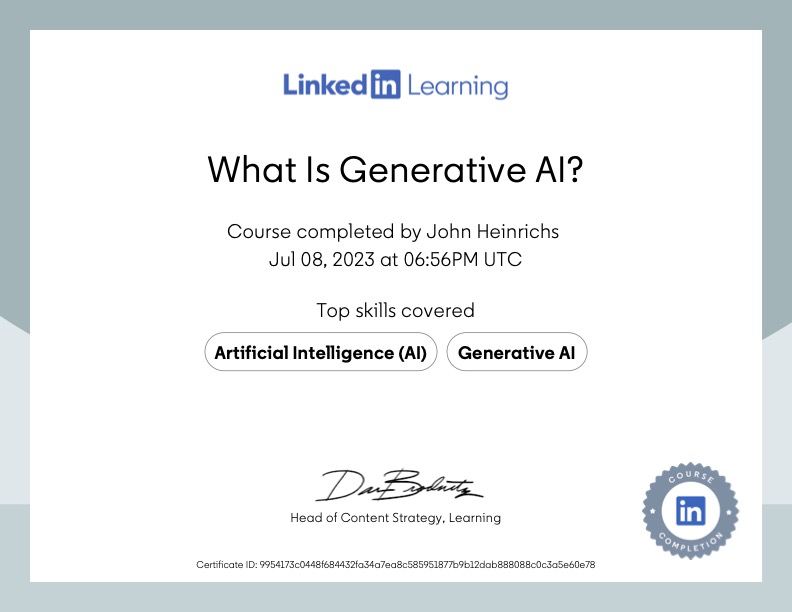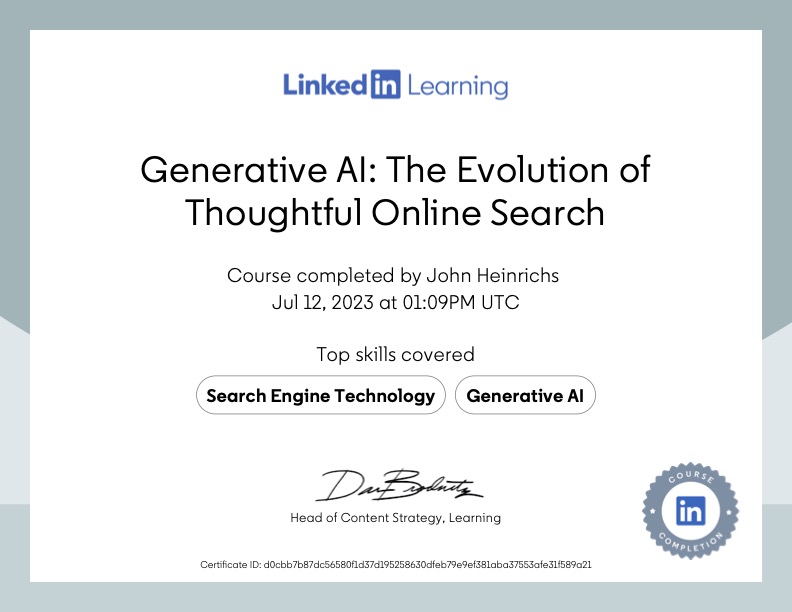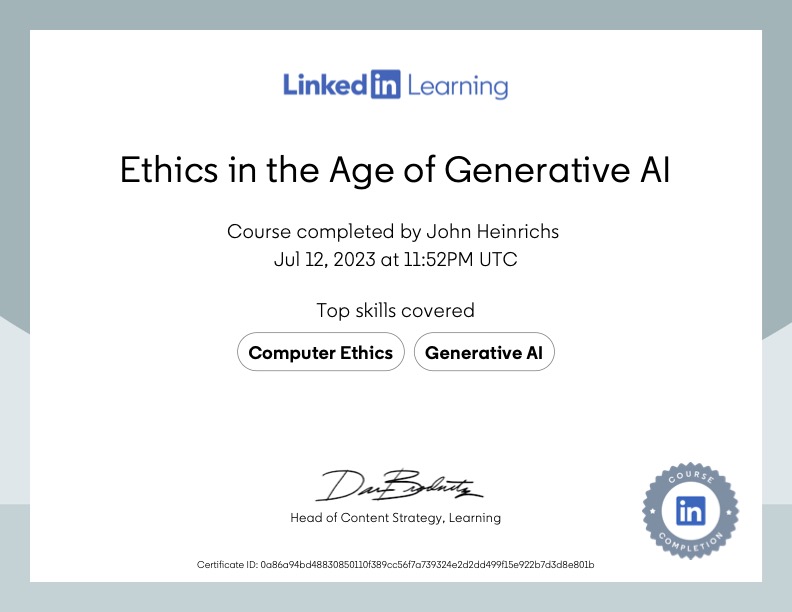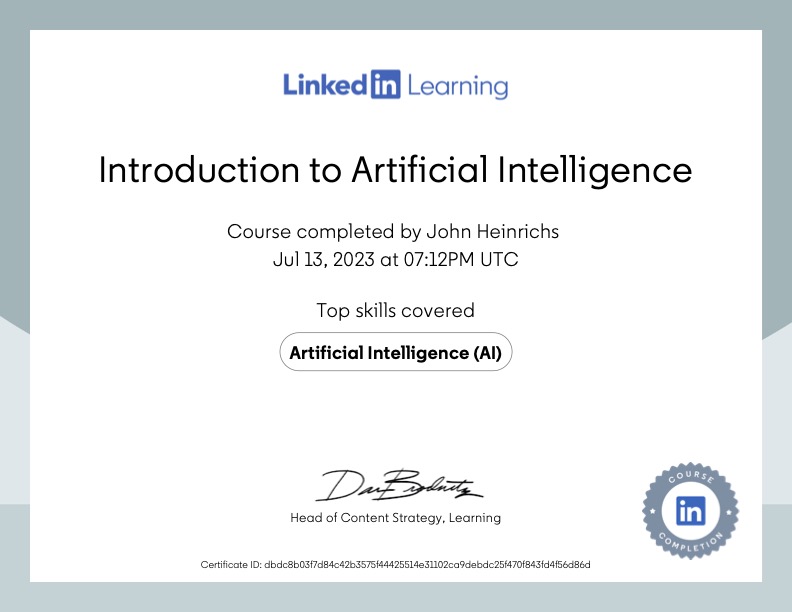Career Essentials in Generative AI
"Any sufficiently advanced technology is indistinguishable from magic.”
-- Arthur C. Clarke, Profiles of the Future: An Inquiry into the Limits of the Possible, 1962
Career Essentials in Generative AI
As technology continues to evolve, businesses will continue exploring new opportunities with these emerging technologies.
"It is our moral responsibility as early adopters of AI to provide guidance and education around AI and inform our employees and colleagues on how to overcome their fears, challenges, and biases towards this new tool."
"We live in the time of cutting edge obsolescence." Even though generative AI may be one of the most advanced technologies out there, it's exponential development means that just because you know how things work one week you can simply completely be obsolete the next.
Table of Contents
- Career Essentials
- Course 1. What is Generative AI (42:13)
- Course 2. Generative AI: The Evolution of Thoughtful Online Search (26:00)
- Course 3. Streamlining Your Work with Microsoft Bing Chat (26:00)
- Course 4. Ethics in the Age of Generative AI (38:00)
- Course 5. Introduction to Artificial Intelligence (1:34:00)
Career Essentials
As business technologies continue to emerge and evolve, those who are able to stay ahead of the curve will have a distinct advantage over their competition.
AI is defined as “the ability of a computer or other machine to perform those activities [or tasks] that are normally thought to require intelligence.”
Generative AI is a term for AI systems that generate various forms of novel output, including text, code, graphics, or audio. Generative AI uses deep learning techniques to recognize patterns in data and generate content based on these patterns.
Large language model (LLM) refers to AI models like GPT-3 that are trained on massive amounts of text and can generate human-like responses on the spot by predicting what words come next in a phrase.
Discussion of Emerging Trends
1. What is Generative AI?
What Is Generative AI? (42:13)
- Introduction (1:06)
- 1. What is Generative AI (12:37)
- 2. Main Models (13:50)
- Natural Language Models
- Test to Image Applications
- Generative Adversarial Networks
- Variational Autoencoders (VAE) and Anomaly Detection
- 3. The Future of AI (6:01)
- 4. Ethics and Responsibility (5:48)
- Conclusion (2:52)
https://www.linkedin.com/generative-ai-is-a-tool-in-service-of-humanity
Just finished the course “What Is Generative AI?” by Pinar Seyhan Demirdag!
Check it out: https://www.linkedin.com/learning/certificates/9954173c0448f684432fa34a7ea8c585951877b9b12dab888088c0c3a5e60e78
Relevant Links
- The brief history of artificial intelligence: The world has changed fast – what might be next?
https://ourworldindata.org/brief-history-of-ai - Hugging Face – The AI community building the future.
https://huggingface.co/models - Welcome To Colaboratory
https://colab.research.google.com/ - A latent text-to-image diffusion model
https://github.com/CompVis/stable-diffusion - Welcome to ChatGPT
https://chat.openai.com/ - Lensa is an all-in-one image editing app that takes your photos to the next level.
https://prisma-ai.com/lensa - CoPilot
https://github.com/features/copilot - ChatGPR
https://chat.openai.com/auth/login

2. Generative AI: The Evolution of Thoughtful Online Search
- Introduction (0:53)
- Search Engines vs. Reasoning Engines (15:01)
- How a search engine works
- How a reasoning engine works
- Comparing search engines with reasoning engines
- What is the future of online search?
- Thoughtful Search Strategies and Considerations in Reasoning Engines (9:15)
- Harness the power of prompt engineering
- Thoughtful search strategies and approaches
- Conclusion (1:39)
https://www.linkedin.com/generative-ai-the-evolution-of-thoughtful-online-search
Just finished the course “Generative AI: The Evolution of Thoughtful Online Search” by Ashley Kennedy! Check it out:
https://www.linkedin.com/learning/certificates/
3. Streamlining Your Work with Microsoft Bing Chat
- Introduction (0:47)
- Chatting as a productivity tool
- 1. Get Started With Chat AI (5:32)
- Understand how chat AI works
- Get access to Microsoft Bing Chat
- 2. Chatting With Chat AI (17:28)
- Get your questions answered with chat AI
- Summarize data with chat AI
- Leverage chat AI to compose text
- Solve a variety of problems with chat AI
- 3. Considerations With Chat AI (2:28)
- Know where chat AI data is coming from
- Disclose when you are using generative AI
- Conclusion
- Stay up-to-date with what AI can do for you
Streamlining Your Work with Microsoft Bing Chat
https://www.linkedin.com/learning/streamlining-your-work-with-microsoft-bing-chat

Just finished the course “Streamlining Your Work with Microsoft Bing Chat” by Jess Stratton! Check it out:
https://www.linkedin.com/learning/certificates/
4. Ethics in the Age of Generative AI
- Introduction (0:49)
- Generative AI and Ethics - the urgency of now
- Developing The Skill Of Ethical Analysis In AI (11:04)
- Distinguishing responsible tech from human behavior
- Understanding Vilas' ethical AI framework
- Responsible Data Practices
- Boundaries on Safe and Appropriate Use
- Robust Transparency
- Applying Vilas' framework in a real world situation
- Preparing Your Organization To Address Ethics In AI (25:18)
- Organizing data with ethics in mind
- Prioritizing privacy -- privacy audit,
- Reducing bias
- Promoting transparency -- data governance report
- Preparing technology teams to make ethical decisions (create culture of ethical decision-making)
- possess specific skills
- work under tight deadlines
- subject to regulatory requirements
- Preparing C-Suite in directing responsible AI
- Responsible AI Policy and Governance Framework
- Training requirement
- Identify specific metrics
- Preparing the Board of Directors to manage risk and opportunity in AI
- Consulting your customers in building AI (LISA)
- Listen to users before you start
- Involve customers in design decisions
- Share privacy policies
- Audit your work
- Communicating effectively organizationally and globally (ETHICS)
- Executives and board members
- Technologists
- Human rights advocates
- Industry experts
- Customers and users
- Society
- Organizing data with ethics in mind
- Conclusion (1:30)
- Setting an intention of continual questioning
Just finished the course “Ethics in the Age of Generative AI” by Vilas Dhar! Check it out: https://www.linkedin.com/learning/certificates/
5. Introduction to Artificial Intelligence
- Introduction
- What is Artificial Intelligence (9:21)
- Define general intelligence
- The general problem-solver
- Strong versus weak AI
- The Rise of Machine Learning (6:25)
- Machine learning
- Artificial neural networks
- Common AI Systems (13:38)
- Searching for patterns in data
- Robotics
- Natural language processing (NLP)
- The internet of things (IoT)
- Learn From Data (6:47)
- Labeled and unlabeled data
- Supervised learning
- Unsupervised learning
- Massive datasets
- Training dataset
- Test dataset
- Labeled and unlabeled data
- Identify Patterns (9:55)
- Classify data
- Binary classification -- uses supervised learning
- Cluster data
- uses unsupervised learning
- Reinforcement learning
- reward to find new patterns
- Q-Learning -- improve outcome
- Classify data
- Machine Learning Algorithms (17:03)
- Common algorithms
- K-nearest neighbor (KNN)
- Euclidean distance
- Classification predictors
- K-means clustering
- Unsupervised machine learning algorithm
- Centroid
- Regression Analysis
- Supervised machine learning algorithm
- Outcome / Predictor
- Naive Bayes
- All predictors are independent of each other
- Class predictor probability
- Fit The Algorithm (9:41)
- Select the best algorithm
- Ensemble
- Bagging / Stacking
- Ensemble
- Follow the data
- Bias and Variance Tradeoff
- Overfitting and underfitting
- Select the best algorithm
- Artificial Neural Networks (9:27)
- Build a neural network
- Feedforward neural network
- used for supervised learning
- Weighing the connections
- world of probabilities
- The activation bias
- Build a neural network
- Improve Accuracy (7:09)
- Learning from mistakes
- cost function -- measure against correct answer
- gradient descent
- back-propagation of errors
- correct backwards
- Step through the network
- Learning from mistakes
- Where to Go From Here (4:36)
- Using AI systems
- Applying AI to solve problems
Just finished the course “Introduction to Artificial Intelligence” by Doug Rose! Check it out: https://www.linkedin.com/learning/certificates/



